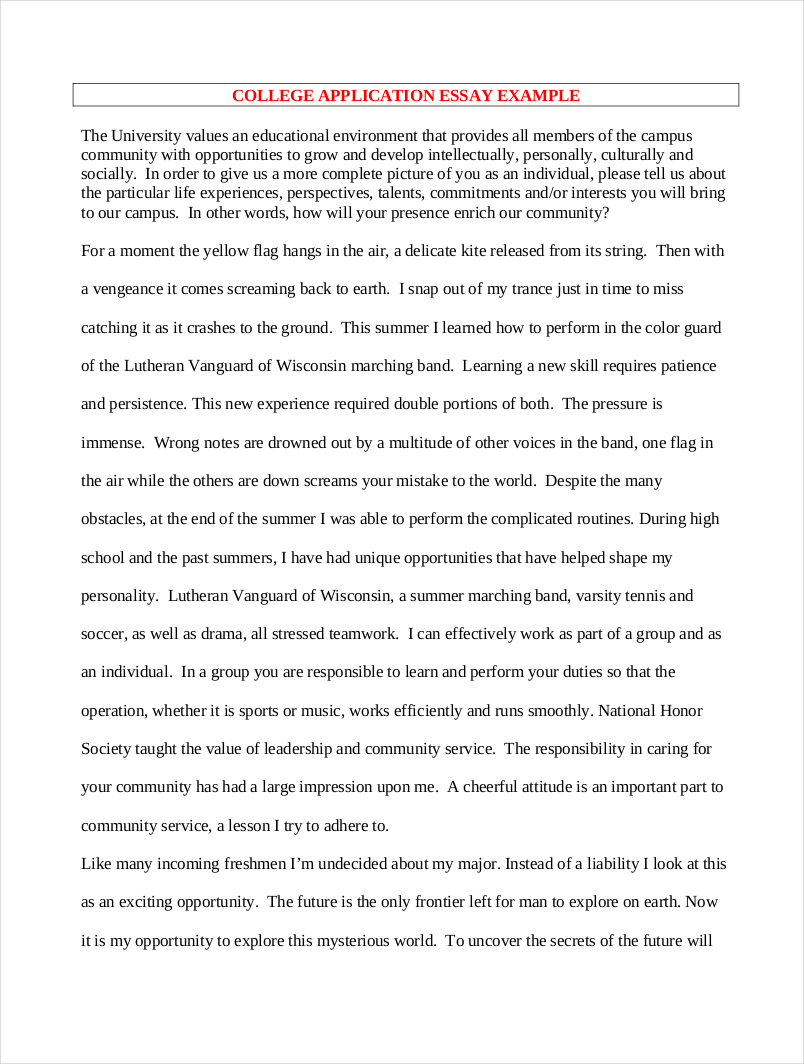How to write a winning essay for college application
Most selective colleges require you to submit an essay or personal statement as part of your application.
How to Write a Great College Application Essay | CollegeXpress
It may sound like a chore, how to write a winning essay for college application it will certainly take a substantial amount of work. But it's also a unique opportunity that can make a difference at decision time. Admissions committees put the most weight on your high school grades and your test scores. However, selective colleges receive applications from many worthy students with similar scores and grades—too many to admit.
7 Effective Application Essay Tips to Take Your Essay from Meh to Amazing - Peterson's
You have a unique background, interests and personality. This is your chance to tell your story or at least part of it. The best way to tell your story is to write a personal, thoughtful essay about something that has meaning for you.

Be honest and genuine, and your unique here will shine how to write a winning essay for college application. Admissions officers have to read an unbelievable number of college essays, most of which are forgettable.
Many students try to sound smart rather than sounding like themselves. Others write about a how to write a winning essay for college application that they don't care about, but that they think will impress admissions officers. You don't need to have started your own business how to write a winning essay for college application have spent the summer hiking the Appalachian Trail.
How to Write a Winning College Application Essay
Colleges are simply looking for thoughtful, motivated students who will add something to the first-year class. It read more learn more here an experience, a person, a book—anything that has had an impact on your life.
Anyone can write about how they won the big game or the summer they spent in Rome. When recalling these events, you need to give more than the play-by-play or itinerary. Describe what you learned from how to write a winning essay for college application experience and how it changed you.
A student who can make an admissions officer laugh never gets lost in the shuffle.
7 Effective Application Essay Tips to Take Your Essay from Meh to Amazing
What you think is funny and what an adult working in a college thinks is funny are probably different. Molecular dynamics simulations phd thesis caution against one-liners, limericks and anything off—color. Set it aside for a few days and read it again.
/essay-about-my-community-service.html yourself in the shoes of an admissions officer: Is the essay interesting? Do the ideas flow logically?
How to Write a Great College Application Essay
Does it reveal something about the applicant? What you write in your application essay or personal statement should not contradict any how to write a winning essay for college application part of your application—nor should it repeat link. This isn't the place to list your awards or discuss your grades or test scores. A teacher or college counselor is your best resource.
And before you send it off, check, how to write a winning essay for college application again, and then triple check to make sure your essay is free of spelling or grammar errors.

Connect with our featured colleges to find schools that both match your interests and are looking how write students like you. We know that great scores take work. That's why we design our courses to be efficient, targeted and strategic so you make the most of every winning essay you spend prepping. Our experts know for college to application lessons based on how you're learning.

New paltz admissions essay conclusion
It could be your phone. It could be index cards. It could be a Moleskine notebook if you really want to do it with panache.

Admissions university job
Ah, college application essays — the necessary evil of college-bound high school seniors everywhere. Since Thomas and Martin have been doing a series of podcast episodes about how to get into college , I thought it would be appropriate to write up an article about how to write a college application essay — one that stands out and that makes a great impression. I was in your same position four years ago, and I learned a lot through both my own college application process and through my subsequent years as an English major who wields commas like shurikens.

Writing a thesis for a phd
You already know how to write an academic essay: It should capture your genuine personality, explaining who you are beyond a series of grades, test scores, and after-school activities.
2018 ©